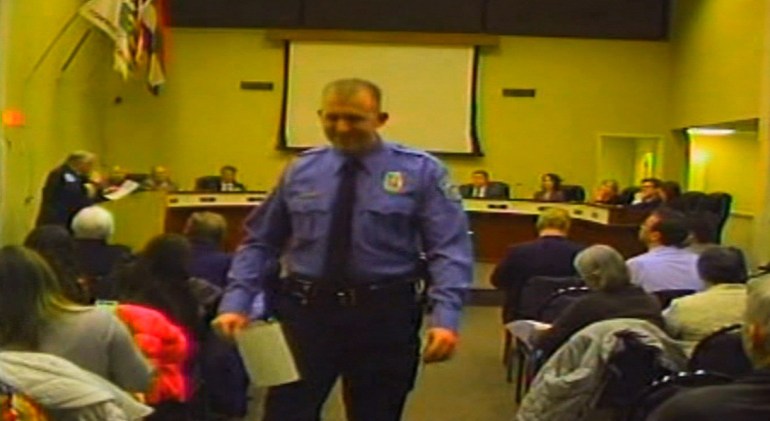
(CNN) — Now that a Missouri grand jury has decided not to indict Officer Darren Wilson, what will happen to the man who killed an unarmed teen in the line of duty?
Technically, the 28-year-old officer could return to his job at the Ferguson Police Department. But many believe he will never work as a cop again.
Wilson was in the final stages of negotiations with city officials last week to resign, according to people close to the talks. The eight-year police veteran has told associates he will resign to help ease pressure and protect his fellow officers, the sources said.
“It would be senseless for him to go back to Ferguson,” CNN legal analyst Mark O’Mara said. “And I don’t even think he can go back to law enforcement, for the same reason. He is still now going to carry with him this mantle that he was the cop who killed the young black kid that sparked the controversy nationwide.”
But if Wilson wants to remain on the job, he could put up a fight. The police union would back him, CNN legal analyst Paul Callan said.
“In the end, he has certain due process rights under Missouri law, and they can’t just summarily fire him because he’s unpopular,” he said. “They will have to prove that he violated some aspect of his employment contract as a police officer, or civil service regulations. Otherwise, he will have a very good lawsuit.”
Still, most people believe Wilson will never again wear a badge.
“If I’m the mayor of Ferguson, believe me, you would want that cop out because you know that he will be controversial,” Callan said. “He will be distrusted by the citizenry and maybe subjected to abuse when he’s out on the street. It’s just going to be nothing but trouble. They’re going to find a way to get him out. They may try to buy him out.”
More investigations
Wilson is still the subject of an internal investigation by the Ferguson Police Department over what happened on August 9, the day he fatally shot unarmed teenager Michael Brown.
And the U.S. Justice Department is conducting two civil rights investigations: one into whether Wilson, who is white, violated Brown’s civil rights, and the other into the police department’s overall track record with minorities.
O’Mara says he believes the federal investigation into Wilson’s actions will lose steam.
“A federal investigation for civil rights violation is very difficult to accomplish,” he said. “You really have to show that the person acted with the intent to take away your civil rights, meaning I did what I did because you’re black. That’s a protected class.”
The decision to open a federal probe of the Ferguson shooting was largely political, he said.
Since the grand jury declined to indict Wilson, one could conclude that the shooting was justified based upon Wilson’s and Brown’s actions.
“That’s more evidence that he acted in self-defense,” O’Mara said.
‘More stringent’ federal probe possible
Callan said the lack of an indictment could push the federal government to “open a much more stringent and powerful investigation” of Brown’s shooting.
“Now they know he’s not going to be prosecuted on a state level, and the feds have a right to do a completely independent investigation, and they’re not bound in any way by grand jury determination,” he said.
Whether the Justice Department brings charges, however, is another story.
“As a general rule, the feds really only get involved when they have a really strong case.” Callan said. “I wouldn’t imagine they’re going to swoop in on this one too quickly.”
Wrongful death lawsuit possible
Brown’s family will probably file a wrongful death lawsuit against Wilson and the Ferguson Police Department, Callan and O’Mara said.
The Browns recently hired famed pathologist Michael Baden to conduct a second autopsy of Brown’s body, which Callan says is a move presumably “to support a civil lawsuit for money damages later.”
“They’re going to sue a lot of people, and there’s no reason not to,” O’Mara added.
Callan said Brown’s family could file a lawsuit against Wilson and the police department under Section 1983 of Title 42 of the U.S. Code — a federal statute that permits damages against state officials for violations of legal or constitutional rights.
But, O’Mara points out, law enforcement officers are afforded certain legal protections.
“We strap guns on them and say, ‘Go out there and put yourself in danger,’ ” he said. “So they even have an extra level of immunity of sorts. … Overall, Wilson probably acted within the confines of what he’s supposed to do.”
But Wilson will forever be connected to this divisive case that sparked weeks of unrest in the St. Louis suburb.
“Darren Wilson is going to have a tough time because even if the presumption was he did nothing wrong, that doesn’t matter. He is now the focus point for all the anger and animosity that exist in the black community.”
—
CNN’s Holly Yan and Eliott C. McLaughlin contributed to this report.

